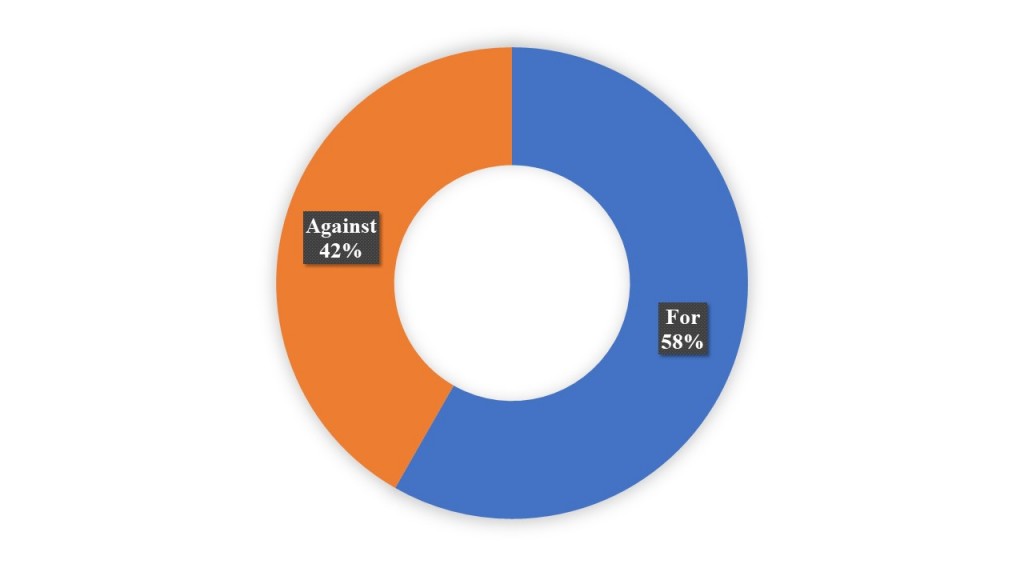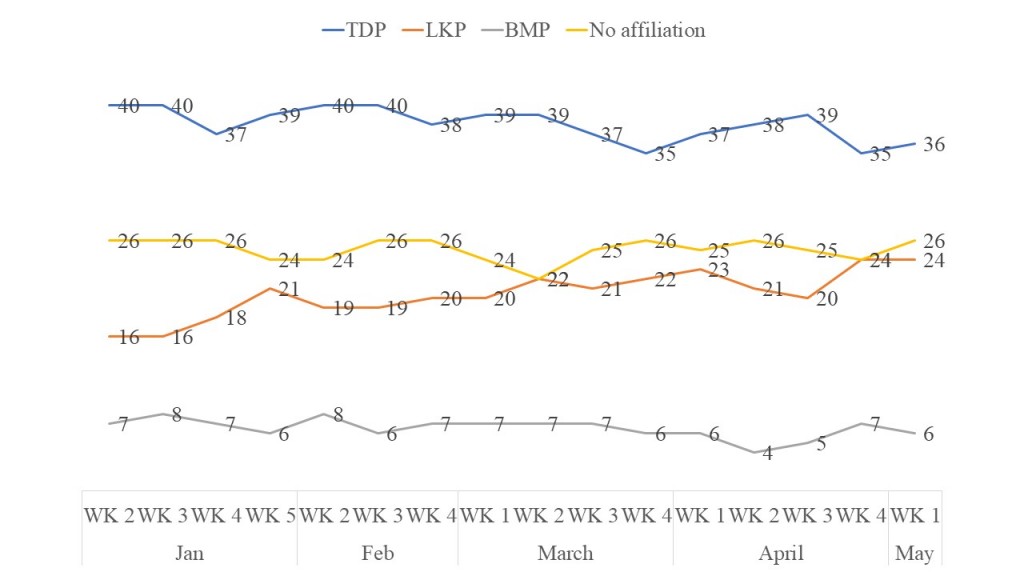Fast Track and National Assembly
On April 29, four political parties (i.e. Together Democratic Party (TDP), Justice Party (JP), Party for Democracy and Peace (PDP), Bareunmirae Party (BP)) voted to “fast track” the five legislative bills approved by the Panel on Judicial Reform and Political Reform.[1]
Altogether there are five bills under consideration – namely, Amendment of the Criminal Procedure Act, Amendment to the Prosecutor’s Office Act, Amendment to the Public Election Act, and two bills related to the installation of the special investigative body for high ranking officials.[2] The Public Official Election Act seeks to increase the number of proportional representation seats in the National Assembly from 47 to 75 and lower the voting age to 18.
A fast-tracked bill in South Korea can be voted in the National Assembly’s plenary session within 330 days. Prior to the National Assembly vote, the bill will be deliberated in the relevant Standing Committee for a maximum of 180 days. If this committee fails to reach a conclusion by the end of 180 days, the Legislation and Judiciary Committee will review the bill within 90 days. The bill will then be reviewed for another 60 days in the National Assembly before being automatically put to vote if no agreement is reached.[3] In short, if deliberation in the relevant committees does not result in adequate consensus to bring the bill to vote on the floor, the bill will be subjected to a floor vote in 330 days.
The fast-track option was strongly opposed by the Liberty Korea Party (LKP) because this procedure prevents the LKP from preventing a bill from coming to a floor vote. The LKP opposes the amendment to the Election Law because it may reduce the number of LKP seats in the National Assembly while increasing the seats of other smaller parties.
Nonetheless, the future of the fast-tracked bills remains uncertain. The LKP has vowed to prevent the bills from passing the National Assembly while the BP is split about this issue.[4] The public opinion polls show that 51.9% favor the recent development while 37.2% are opposed.
Public Opinion on Fast Track[5]
Political Party Support[6]
North Korea
North Korea fired multiple rounds of short-range missiles from its east coast town of Wonsan directed towards East Sea around 9:06-9:27 am on May 4. The missiles flew for about 70~100km. The Japanese government stated that the projectiles were not ballistic missiles and that they did not reach Japan’s maritime zone. Secretary Pompeo stated that the US will continue to keep dialogue channels open and that the latest act by North Korea was not threatening.
On April 25, North Korean leader Kim Jong Un met with Russian President Vladimir Putin in the Far Eastern University in Vladivostok.[7] The meeting which lasted three hours was the first meeting between the two leaders in eight years. North Korean diplomat Choi Sun-hui and Ri Yong-ho accompanied Kim while nine Russian officials including Minister Sergey Lavrov, President of Russian Railways Oleg Belozerov, Minister of Transport Yevgeny Dietrich, and Deputy Minister of Energy Yanovsky Anatoly were present. The two sides discussed North Korean sanctions, economic cooperation, and Russia-DPRK relations.
On April 27, Goseong DMZ peace trail opened to the public.[8] Government’s initial plan was to open up the DMZ in three regions (i.e. Goseong, Cheorwon, and Paju) but only Goseong is open due to safety concerns. On the same day, President Moon delivered a speech to mark the First Anniversary of the Panmunjom Declaration. President Moon emphasized the need to be patient with North Korea.[9]
Korean media outlets reported that the UN Command will hand over the administrative authority of the JSA to South Korea.[10] The UN Command, however, will still hold legal jurisdiction of the JSA. This arrangement follows the Sept 19 Agreement, in which the two Koreas agreed to demilitarize the JSA.
President of Chile visits South Korea
Chile’s President Sebastian Piñera visited South Korea during April 28-29.[11] He held a summit meeting with President Moon and discussed expanding the economic partnership between South Korea and Chile as well as enhancing cooperation on peace in the Korean Peninsula and South America. President Moon also expressed his willingness to become an associate member of the Pacific Alliance. The two heads of state signed a bilateral agreement on defense cooperation and three MOUs on ICT and transportation.
Japan
On April 23, a number of Japanese lawmakers visited the Shrine to pay respects to the country’s war dead. Instead of visiting the shrine, Prime Minister Abe sent a masakaki offering. South Korea’s Ministry of Foreign Affairs issued a statement, expressing “deep disappointment and regret.”[12]
Meanwhile, Japan decided not to participate in the joint naval exercise in Busan involving 18 members of the ASEAN Defense Minister’s Meeting-Plus (ADMM-Plus). The joint naval exercise consists of two parts. Japan decided not to take part in the first part hosted by South Korea, but Tokyo announced that it will participate in the second part which will take place in Singapore. The dispute between South Korea and Japan began last December over Tokyo’s claim that a South Korean naval warship directed its fire-control radar against a Japanese patrol plane.[13]
New Ambassadors to ASEAN, Japan, and Russia
On May 3, Former Vice Foreign Minister Lim Sung-nam was nominated as the new ambassador to the Mission of the Republic of Korea to the Association of Southeast Asian Nations (ASEAN) in Jakarta. Lim is a career diplomat with over three decades of service. Before becoming the Vice Foreign Minister, Lim served in various high-ranking positions. He was once the chief negotiator to the Six-Party Talks and the ambassador to the United Kingdom. Former Deputy Director of the NSC Nam Gwan-pyo and Consul General in Vladivostok Lee Sok-bae were officially appointed as the new ambassadors to Japan and Russia, respectively. Ambassador Cho Yoon-je remains at his current position in Washington.[14]
Economy
According to the latest data released by the Bank of Korea (BoK) on April 25, South Korea’s economy contracted by 0.3 percent points in 2019 Q1 compared to 2018 Q4. This is the most significant decrease since the 2008 Q4 when the country’s economy contracted by 3.3 percent points. Experts cite falling exports and facilities investment as the main reasons for the disappointing performance. Exports fell by 2.6 percent in the first quarter of this year, led by the weak performance of semiconductors. Facilities investment declined by 10.8 percent, due to a decrease in demand for machinery and transportation equipment.[15]
[1] “공수처·선거법 패스트트랙 한밤 지정”, 중앙일보, 2019년 4월 30일.
[2] Official website of the National Assembly of the Republic of Korea, [available at: http://korea.assembly.go.kr/wha/pre_list.jsp?boardid=1000000028]
[3] “우여곡절 끝 패스트트랙 태웠으나 험로 예고…향후 절차는”, 동아일보, 2019년 4월 30일.
[4] “본회의 표결때 `반란표` 배제못해”, 매일경제, 2019년 4월 25일.
[5] Realmeter, Date: April 30; sample size: 503; margin of error: +4.4 at the 95% confidence level.
[6] Gallup Korea, Date: April 30, May 2; sample size: 1,000; margin of error: +3.1 at the 95% confidence level.
[7] “김정은 “더 없이 귀중한 친구” 푸틴 “힘 합치면 산 옮길 수 있다”,” 중앙일보, 2019년 4월25일.
[8] “[최초공개] DMZ 평화의길 가니, 지뢰에 부서진 포크레인이…,”중앙일보, 2019년 4월 27일.
[9] The Blue House official website, [available at: http://www1.president.go.kr/articles/6196 ]
[10] “[단독]유엔사, JSA 행정적 관리권 남측에 넘긴다,” 경향신문, 2019년 4월 30일.
[11] “文, 칠레 대통령과 정상회담…‘한·중남미간 FTA 네트워크 구축“,” 동아일보, 2019년 4월 29일.
[12] “정부 ‘일본 의원 야스쿠니 신사 참배, 깊은 실망과 유감’,” 조선일보, 2019년 4월 23일.
[13] “초계기 갈등 석달째…日, 한국주관 12개국 해상훈련 불참,” 조선일보, 2019년 4월 28일.
[14] “駐아세안대사 임성남, 주일본 대사 남관표, 주러시아 대사 이석배,” 조선일보, 2019년 5월 3일.
[15] “1분기 성장률 -0.3%…금융위기 후 10년여 만에 최저(종합),” 연합뉴스, 2019년 4월 25일.
Contributing Staff (in alphabetical order): Hong Sang-hwa and Kim Seonkyung
Editor: J. James Kim

 Facebook
Facebook Twitter
Twitter
